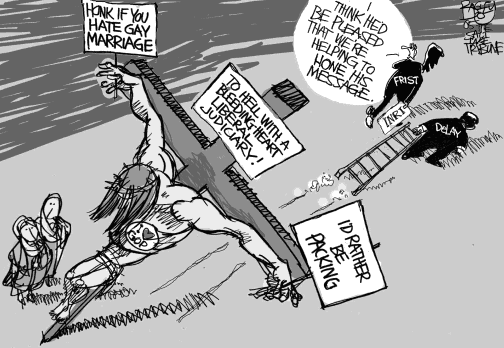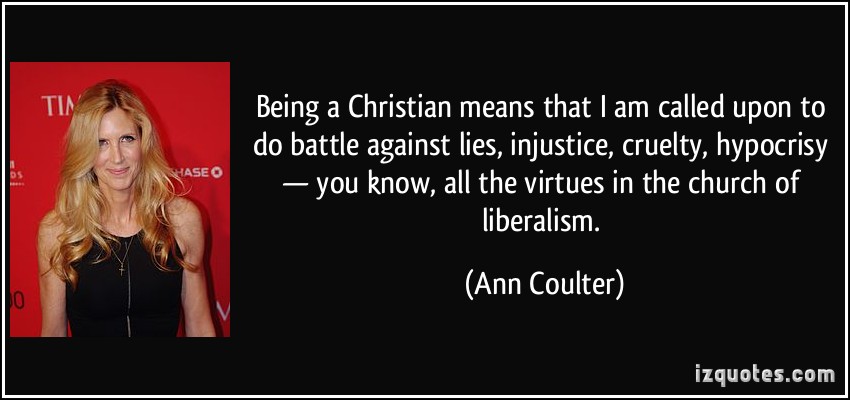People are quickly losing interest in “the church” as an institution. Young people and the millennial generation, in particular, are the least religious of any generation in America today, according to a Pew survey. Is this because many right-wing churches are driving away people as they become more accepting of progressive policies? Did the sex abuse scandal scare off Catholic parents who want to protect their children? Is it even, as the right-wing has proposed, a downfall in family values? No, according to “Church Militant,” altar Girls and “feminized kids” are the culprits…. Panelist Matthew Pearson connects the problems to the sex abuse scandal in the Catholic Church which he attributes to boys raised by single mothers who lack strong father figures. “Because all these feminized kids without fathers yearn to go somewhere where they maybe find a father figure,” he began. “They were feminine. They became gay and they all went to the same place. They all went to the seminary looking for the father and they found predator fathers who then coerced them into, ya know, and that’s where we have this gay sex scandal that’s just ravaged the church for now 40, 50 years.”
 It’s been said that the first step to solving a problem is the admission that you in fact have one. That so many Christians are so firmly rooted in denial and projection would seem to explain why they can’t recognize the problem staring back at them in the mirror.
It’s been said that the first step to solving a problem is the admission that you in fact have one. That so many Christians are so firmly rooted in denial and projection would seem to explain why they can’t recognize the problem staring back at them in the mirror.
When you lack any semblance of self-awareness, it’s easy to blame others- Liberals, atheists, gays, Hollywood, single-parent families, etc., ad infinitum, ad nauseuem- as being responsible for the declining collective commitment to an institution you hold dear. If only people were less selfish and materialistic and more willing to accept things on faith, right?. Surely then they’d find it within themselves to accept Jesus Christ as their personal savior (and subject themselves to an arch-conservative church mired in 15th-century dogma and demanding of complete and unquestioning obedience).
Of course, there’s no way any REAL Christian could accept that the decline in church attendance has anything to do with dogma that doesn’t speak to millennials where they live. Or that too many of those who claim religious authority are themselves morally bankrupt, power-hungry Pharisaical zealots whose primary concern is for their own self-aggrandizement and enrichment.
The reason church attendance is declining among millennials (and just about every other demographic) is that people are increasingly less likely to accept having spirituality dictated to and defined for them. They’re less willing to depend on religious institutions, many of whom have proven themselves to be as broken and unresponsive as they are theologically and morally bankrupt. When an institution becomes so sclerotic and inflexible that it no longer speaks to a person’s spiritual needs, it faces a choice- adapt or die. Unfortunately, those in positions of religious authority too often cling to the trappings of their position and become too addicted to their power and influence to recognize the necessity of acquiescing to change. It becomes far easier to blame those who reject the church for being shallow or self-absorbed when they’re simply looking for options that meet them where they live.
As shocking as this may seem to so many good, God-fearing, reflexively Conservative Christian patriots, fewer people are willing to allow their spirituality to be dictated and controlled by those who believe themselves to be ordained by God. Those deeply rooted in cafeteria Christianity are too often unwilling to accept that young people today approach spirituality as akin to a smorgasbord from with they’re able to pick and choose that which best suits them instead of accepting a framework that dictates and defines the spiritual box in which they must live. It’s symptomatic of a rapidly changing world, one in which there’s often no place for an inflexible, top-down, one-size-fits-all religious doctrine. Some may view that as heretical, but when one determines that conventional religious doctrine doesn’t meet them where they live, why wouldn’t one look for a means of expressing your spirituality that reflects and resonates with their values?
If you view the Bible as a rule book, you might not appreciate a person’s need and/or desire to find a means of expressing their spirituality that adds purpose and meaning to their life. Sometimes when people begin to think for themselves, they discover that conventional organized religion doesn’t- and can’t- meet their needs. For some, that doesn’t mean rejecting organized religion outright (my choice), but rather exploring options with an eye towards finding a spiritual framework that adds purpose to their existence. A one-size-fits-all religious doctrine may work for some, but with more young people looking to color outside the lines, it’s not surprising that cafeteria spirituality is increasingly in vogue.
Organized, hierarchical, top-down religious organizations may see this trend as a threat to their continued dominance and primacy…and perhaps it is. I’m not so certain that’s a bad thing.

